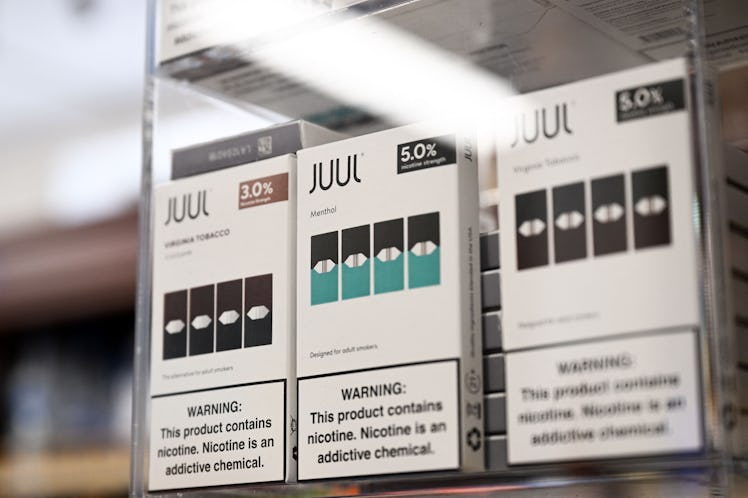The FDA Just Banned Juuls — What's Next?
The FDA has asked Juul to take their signature vapes off the market. Here's how we got here.

From candy cigarettes to Fred Flinstone smoking on Saturday morning cartoons, it's no secret big tobacco companies have targeted children and teens since cigarettes and other tobacco products hit shelves. Since the boom of e-cigarettes, companies like JUUL have been cited as the cause of increased vape use in youth and their subsequent health risks. And now the Food and Drug Administration is taking action.
On Thursday, the Food and Drug Administration made a landmark decision and ordered Juul to pull all of its e-cigarette devices and vapor cartridges from all U.S. markets, continuing the agency’s history of removing addictive products from the hands of youth.
Why Did The FDA Ban JUULs?
The FDA made this decision after Juul filed "insufficient and conflicting" data in an application to keep selling the vapes and said there was not “enough evidence to assess the potential toxicological risks of using the JUUL Products,” per USA Today. Now, Juul must stop marketing and sales of their pods and vapes.
“The (FDA) has dedicated significant resources to review products from the companies that account for most of the U.S. market,” said FDA Commissioner Robert M. Califf, M.D. in a statement. “We recognize these make up a significant part of the available products and many have played a disproportionate role in the rise in youth vaping.”
In a statement sent to NPR, Juul Labs' chief regulatory officer Joe Murillo said the company “respectfully disagree(s) with the FDA's findings and decision.”
JUUL Has Been Under Scrutiny
All the same, JUUL has been under intense scrutiny for marketing to youth since its formation. The company has been cited in numerous studies and reports on the booming usage of e-cigarettes in youth and its health risks. According to the Centers for Diseases Control (CDC), 9 in 10 smokers try their first cigarette before they turn 18. If cigarette smoking continues at its current rate among youth, 5.6 million Americans younger than 18 will die of a smoking-related illness at an early age. Studies have also found that youth who vape are more likely to pick up cigarettes later on.
And kids are vaping. In 2011, less than 5 percent of high school students used an e-cig. By 2019, this grew to nearly 25 percent, just four years after the JUUL launched on shelves.
In 2018, the company discontinued the sale of flavored products such as mango, creme, and fruit and removed the sale of mint and classic tobacco flavors in-store and online. That was followed by a 2020 FDA ruling that prevented the sale of mint- and fruit-flavored vaping products. The company’s only two flavors—Virginia tobacco and menthol—are now unable to sell in the states with the recent FDA decision.
2020 National Youth Tobacco Survey found that 80% of surveyed teens used flavored e-cigarettes. The survey found that the use of e-cigarettes among users was in a slight decline, but the use of the products has boomed in the last decade.
Shockingly, (yet, historically predictably) JUUL allegedly partnered with Nickelodeon and Cartoon Network and placed advertisements on youth-focused television networks’ websites during the early days of the company to get vapes into the hands of kids, according to a 2020 lawsuit filed by the Massachusets Attorney General. The lawsuit also alleged JUUL placed large ad buys with Instagram influencers whose audience ranged from 13 to 24 years old.
What Is The FDA Doing Next?
The FDA’s recent decision to remove JUUL from US shelves comes on the heels of the Biden administration's larger actions against the tobacco industry more broadly. The FDA plans to ban menthol-flavored cigarettes and all cigar flavorings, except for tobacco flavor. In April, the FDA said this ban would “decrease disease and death from tobacco by reducing youth experimentation and addiction." The FDA is also looking at decreasing the amount of nicotine allowed in commercially available cigarettes.
In addition to decreasing youth use, FDA data shows that as of 2019, 18.5 million current menthol cigarette smokers are 12 years old and older, with exceptionally high use in Black communities.
There are free resources for adults and teens looking to kick either the cartons or cartridges that can be found online.